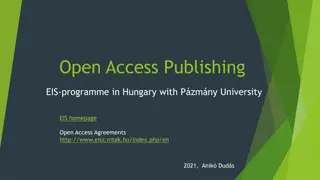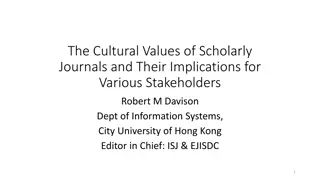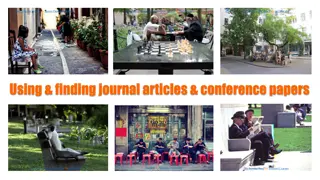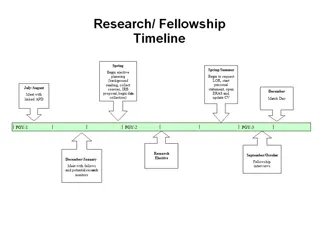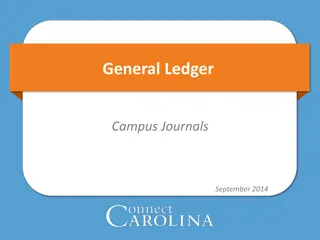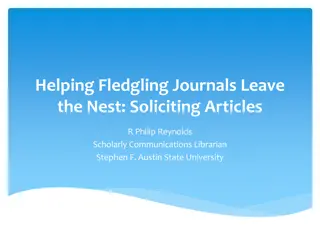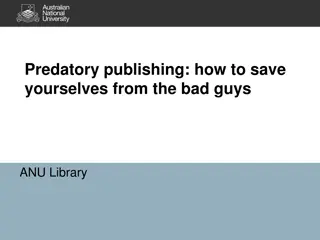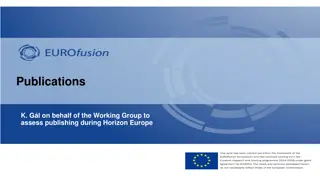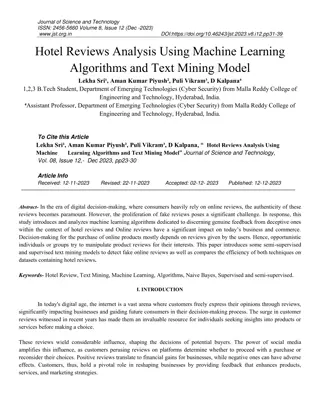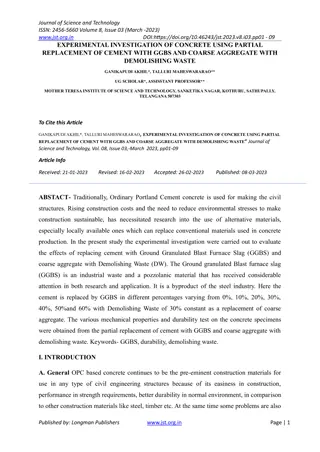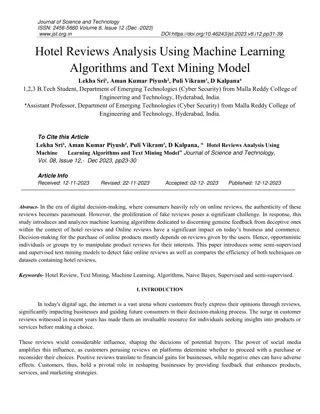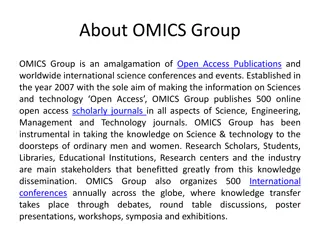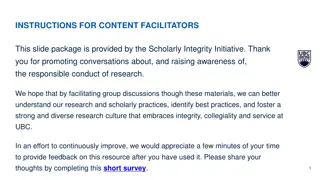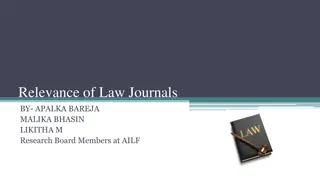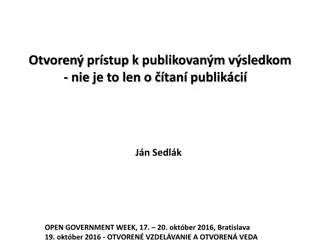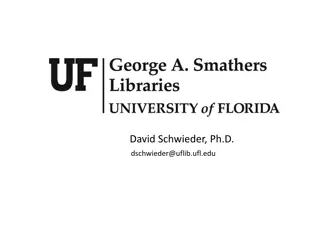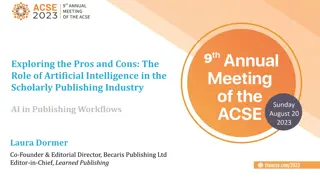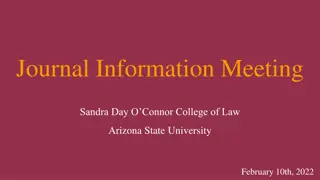Enhancing Scholarly Publishing: Guidelines for Academic Journals
Providing a comprehensive guide for academic journal editors on improving publication quality through structured problem definition, updated bibliography, language proficiency, and resubmission strategies. The document outlines methods for crafting effective abstracts, structuring papers, reviewing literature, and conducting research.
Download Presentation

Please find below an Image/Link to download the presentation.
The content on the website is provided AS IS for your information and personal use only. It may not be sold, licensed, or shared on other websites without obtaining consent from the author.If you encounter any issues during the download, it is possible that the publisher has removed the file from their server.
You are allowed to download the files provided on this website for personal or commercial use, subject to the condition that they are used lawfully. All files are the property of their respective owners.
The content on the website is provided AS IS for your information and personal use only. It may not be sold, licensed, or shared on other websites without obtaining consent from the author.
E N D
Presentation Transcript
Stirling EIS Working Time Agreement Training Wednesday 24th April 2024 Ann Skillen LA Secretary Craig Carson EIS Organiser
Collective Bargaining Collective bargaining is the process of negotiation that trade unions and employers carry out in order to come to an agreement that applies to a group of workers. As an EIS member, your terms and conditions are negotiated at the Scottish Negotiating Committee for Teachers (SNCT) and your Local Negotiating Committee for Teachers (LNCT). Stirling council has an LNCT and each union has representatives at the LNCT, including your LA Secretary, Ann Skillen. The LNCT has the power to vary certain devolved matters locally.
Negotiation The process by which the employer and TU establish an agreed output, e.g. agreement or decision. In negotiations the parties are equal and the responsibility for an output is jointly held between the two parties. (It is distinct from consultation where the responsibility for decision making lies with the employer) Negotiation is a method of resolving conflicting aims. Whilst it can be a formal set piece process, it is an everyday activity. Negotiation can be a long or short process and may involve leveraging the TUs position by campaigning in order to move the employer to an agreement point.
Working Time Agreement Outline A collective agreement reached at school level between trade union(s) and the Headteacher Audited throughout the year and renegotiated annually Governs the allocation of time for defined activities beyond class contact and personal teachers preparation and correction time The most important aspect of the process is that it must have been negotiated and finally agreed between school management and staff (School Negotiating Committee - SNC) Once negotiations are completed, it is signed off as agreed by the Rep and Headteacher The agreement is binding on all staff.
Key Document https://www.snct.org.uk/library/2326/LNCT25%20V2%20- %20Feb%202017.doc
Breakdown of the Working Week 35 hour week for all full-time teachers 22.5 hours of maximum class contact 7.5 hours for personal preparation and correction 5 hours for collegiate activities Where do the 195 hours for the WTA come from? 5 hours per week for collegiate activities 39 weeks x 5 hours = 195 hours (These hours are pro-rata for part time staff)
Balance of Time Additional Time for Preparation and Correction Up to five hours allocated to each meeting Ensure time is allocated to preparation If end on , there should be time for a break Parents Meetings Staff Meetings The number, frequency and duration should be agreed when assessment is summative and part of formal process, e.g. end of unit tests, annual reports, etc. Formal Assessment Frequency and format of planning should consist of constructive, professional dialogue Include work towards school/department/faculty improvement plan Forward Planning Time for PRD meetings sufficient time should be agreed for the update of records & plans in the context of PRD & PU CLPL & PRD Additional Supervised Pupil Activity Flexibility Around 19 hours (10%) should be given to flexibility
School Negotiating Committee (SNC) All schools should have a SNC comprising of management & representatives of TUs. Joint chairpersons are the HT and TU rep with greatest number of members. Decisions must be collegiate in nature. Teaching staff decide how their side of the SNC is constituted. Should reflect the composition of the staff and include reps from TUs. Remit Evaluate previous year s WTA, negotiate balance of time (195 hours), produce a school calendar. SNC should meet termly, within the 35 hour working week, to discuss relevant matters. Recommended two meetings take place in term four. Failure to Agree If agreement can t be reached then joint chairpersons should contact LNCT co-secretaries for advice (Ann Skillen & ***).
School Calendars Dates, times and timings should all be agreed. Take account of part time staff i.e. try to vary the day of the week collegiate meetings take place throughout the year. Parents Evenings should be clearly marked in the calendar and suitably scheduled across the session . During weeks which include parental consultations events, other collegiate meetings should be avoided as far as possible . Once agreed and operating, can only be changed by the SNC.
Audit Process An integral part of the WTA process Completed throughout the year Try to get a spread throughout the school Example below
WTA Negotiating Process Audits should be used to identify where changes to the WTA are required e.g. pressure points in the calendar, redistribution of hours. EIS branch should come together to form a view about priorities for negotiating and prepare a case for each point. The School Improvement Plan (SIP) for the coming year should be part of the considerations as well. Time should also be made available from within the 35 hour working week for staff to consider issues relating to the WTA individually and in departments/faculties/stages .
WTA Negotiating Process Agree who is speaking from your side and when. Make your offer clearly, explaining how it benefits both sides Do you gain more from linking issues or discussing them separately? Whoever is not speaking should be taking notes about what is agreed (or not). Don t argue ask questions. Short, sharp and to the point. Don t feel pressured to fill silence .
Tips for Trading Concede reluctantly If we agree to an extra meeting for x then we will require further time for y. Concede with conditions Highlight the exceptional nature of the concession Stress importance of members to the process school branch will be very difficult to persuade Use strong, collective language - we need, we must have, we require, we are prepared to.
Desired Outcomes Reduction in workload achieved Revised arrangements in place Teacher voice listened to in school Act now! Act together! Take Control of Workload!




